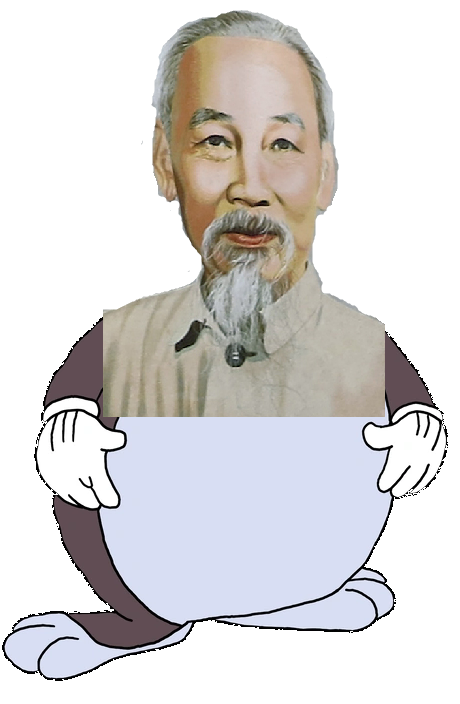“Communism bad”
“Why?”
200 year old tropes so ancient they were debunked by Marx himself
Of course, you go through the motions of explaining the most basic political concepts that could be grasped by skimming the cliff notes for literally any Marxist works
“Friedrich Engels? Is he like the president of Germany or something?”
It’s like a kindergartener trying to teach you calculus.
Liberals keep saying history is written by the winners while simulatenously believing everything Westerners wrote about communism after the Cold War.
You also get libs from ex-socialist countries that go
"You wouldn't like communism like I lived it in x Warsaw pact country " 
Then they follow that with the most racist, fascistic thing possible. Happens everytime
Don’t forget born in 1992
It could be as G!merbrained as seeing the winners writing the history as based because that just means the winningest winners deserved to win, every time. Secular Calvinist shit.
Nah, I think that those two takes, like many others, just exist in separate, frictionless vacuums for libs; the metaphorical venn diagram has no overlap to them.
History is written by the winners only applies to bad country, and Communism is bad because I was told that in school.
I may have come up with a too-generous way for the libs to reconcile those contradictions. It's probably easier for them that they don't even notice the contradiction.
In every American community, you have varying shades of political opinion. One of the shadiest of these is the liberals. An outspoken group on many subjects. Ten degrees to the left of center in good times, ten degrees to the right of center if it affects them personally.
- Phil Ochs, Love Me I'm a Liberal, 1968
I heard "ten degrees" as "tend to graze". I love when your brain substitutes random shit but it still makes sense.
Edit: in hindsight I think it's a good change. Represents the herd mentality of liberal thought.
Yeah that is actually really good
200 year old tropes so ancient they were debunked by Marx himself
In the very first lecture of my Macro 101 course in undergrad, my libertarian econ professor talked about how if the LTV was correct then an inedible mud pie would have as much value as a real pie. I was delighted when I first read Capital and I saw that Marx debunked this very myth like on page 4. Marx is great at anticipating objections and then thoroughly responding, it’s just the libs don’t bother to read him.
"socially necessary labor time" is a phrase to liberals like garlic to vampires
It's lovely to hear people say that Marx has been debunked. Have they read Marx? No, of course not. The debunkers who they DID read hadnt either so this conversation is always pleasant 
They aren’t interested in the truth. They’re interested in “debunking” Marxism by any means necessary. It’s the political version of the gamer thing where you don’t need to actually play the game to decide it’s bad because professional opinion havers already told you what to think.
What is the debunking, for those of us who are unread savages.
value is produced not by "any labor time that i imagine" but by "socially necessary labor time." mud pies are not socially necessary in any context, and it would be an absurd counterfactual to attempt to defend. the hypothetical society too stupid to realize that mud pies are worthless.
mud pies are worthless

Are these dumbasses aware that they’re not the first people in the world to think of the most basic and simple objections?
It worked for  who claims to have studied communism for over 20 years and by study he meant be really mad at the Manifesto.
Western “communism studies” invariably consists of undergrad classes taught by either cold warrior professors or miserable academics, and the “study” consists entirely of regurgitating passages from whatever pseudointellectual anticommunist steaming drivel Anne Applebaum shat out this year.
I think he's read Solzhenitsyn too haha
I've read the Gulag Archipelago that Peterson recommends.
It's the most propaganda ridden book I've read about the USSR, so many factual inaccuracies and lies.
Dude's own ex wife said in an interview that it's all nonsense
"It's not true, but it basically is true because that's how I already felt about gommunism vuvulzula gorillion dead!"

This is gonna sound like it's a bit and that I'm just parodying Peterson's way of speaking in vague hand-wavey style but I promise you that it's not and I'm legitimately making an argument here…
To Peterson, the historicity of The Gulag Archipelago is irrelevant to him because it represents a higher order, metaphorical truth.
When you grasp this about what is important to Peterson's approach to truth then it becomes very obvious that he plays fast and loose with facts because he's not concerned with mundane truths that are the domain of historians and scientists, in fact he holds them in contempt especially when they run counter to his understanding, because he sees his purpose in uncovering and elucidating the metaphorical truths that structure our existence.
If this sounds like a bunch of nonsense woo then you're right. If this sounds like the attitude of an aspiring prophet then you're right.
But if you want to really understand how Peterson's brain works and why his avid followers seem largely immune to facts then this is the mentality that you need to wrap your head around. Pretty much everything that Peterson does is a sort of exegesis on this higher order, metaphorical truth that he's both attempting to understand himself while attempting to articulate it to his audience at the same time.
There's a quote from him that really illuminates his belief about his "mission". I'll try to find it and if I do I'll edit it into this comment.
To Peterson, the historicity of The Gulag Archipelago is irrelevant to him because it represents a higher order, metaphorical truth.
I know he'd argue that. He's on a very special personalized level of solipsism with The Secret characteristics.
To Peterson, the historicity of The Gulag Archipelago is irrelevant to him because it represents a higher order, metaphorical truth
And to add on to your comment, I think Solzhenitsyn himself sort of takes this approach in writing. I’ve heard Gulag Archipeligo described as “campfire stories about the gulags”, and I think that’s very apt. It’s not factual information, it’s just him gathering stories he hears from others. Whether or not those stories are true isn’t relevant. Solzhenitsyn saw it as his mission to bring down the USSR (and replace it with some Christo-fascist authoritarian state) and whatever stories he needed to pull out of his ass to make that happen was fine by him.
I'm totally picking up what you're putting down here, yeah these people love subjectivr metaphorical truths, it gives them a spiritual charge. Its like they live in a world of pure signifiers, like they exist in a fog of metaphor and allegory and symbolism (they fuckin love their numerology too). It's like they're hoping to reach some kind of existential truth by tunneling through nonsense. It's ironic that theyre the ones who bang on and on about "facts and logic" because they have neither. They use the concepts as ritual fetishes, invoke their strange bile and wave around an ornate little doll called Facts and Logic. They present themselves as unassailable, because they have the doll on their side, but as soon as you assail them it crumples.
theyre the ones who bang on and on about "facts and logic" because they have neither. They use the concepts as ritual fetishes, invoke their strange bile and wave around an ornate little doll called Facts and Logic

I seem to recall this article going into it in more depth, but yes, Peterson himself has described his philosophy as "Pragmatism", basically he thinks knowing actual truth is impossible and even if it was it maybe undesirable, so he thinks humans should basically do grand scale "Truthiness" and make up whatever shit allows people to live most efficiently. Basically explains his fixation with myths and stories, he thinks we should all treat them as "real" and leave them unexamined cuz they're supposed to be guides to humanity or whatever.
"Well the fact that I could believe it really says something about society"
"He could have been simply brave for speaking truth to power, but instead he was braver for speaking untruth for power"
I'm aware.
Even if you tell libs/conservatives that, they just ignore it and say that her interview is just propaganda. Unreal.
Unfalsifiable orthodoxy 
I'm assuming that you didn't literally work for  , but (from what I can tell) this is exactly what he means by "studied communism" also: he collects the propaganda artwork and gets mad at Marx as he's concocted him in his head.
I've had classmates, roommates, and faculty peers that were devotees of 
realizing this has actually helped my mental health so much. liberals are fundamentally unserious about politics, so I simply don't have to care what they think, in the same way I don't care about childrens opinion on topics they dont understand. it's very liberating, I've found
Death to America
The most common experience I've seen new leftists talk about is how overwhelmingly large the left is and how much there is to learn. The average switched off liberal has missed out on decades of political education.
Even PhDs aren't great. I've had history professors tell me directly that communism in practice is the same as monarchy. One time a sociology prof I had was having a casual chat with me about why socialists can't achieve their aims unless they integrate within American Protestantism. Then he called Marxism a religion.
For the life of me I just want some educated liberals who know their class position and I want them to be openly evil about it. That would be so much easier. I thought that's what self-identified neoliberals would be, but even they're very confused.
For the life of me I just want some educated liberals who know their class position and I want them to be openly evil about it. That would be so much easier. I thought that's what self-identified neoliberals would be, but even they're very confused.
You have to look for these among social democrats of the 90s and early 2000s in Europe. Many of them were former Marxists in the 60s, 70s, throwing bombs at cops etc. They adapted to throwing bombs at middle easterners and implementing radical market reforms (increasing the exploitation rate) to "fix" Capitalism accomplish capitalist goals.
The people you mention in the last paragraph that are openly evil had to work very hard to overcome their humanity or they were born sociopaths. It's hard for an average normal non-reptilian dork to read 100 wikipedia pages about liberalism and admit that he wants to plunge the entire earth into labor camps for profit. They need many layers of plausible deniability to convince themselves that they have good intentions and that they should definitely not be stricken from this world
or the life of me I just want some educated liberals who know their class position and I want them to be openly evil about it.
You mean Hill dawg and Obama
The more Marx (or good Marxist theory more generally) that you read, the more you realise how detached from reality liberal discourse about anything even remotely connected to Marxist thought is. This is blindingly obvious in mainstream economics departments, where the average professor or TA normally manages to combine both shocking ignorance of any economic theory beyond their barrenly narrow purview, and depressing naivety when it comes to the apparent self-evidence of their arguments.
That being said, economics is only the most obvious example. Set foot inside the average history, sociology or anthropology department and the epistemic consequences of a lack of Marxist approaches becomes immediately obvious when you see the low quality of alot of the work being produced and ask why that's the case.
History probably has the best showing, although it's nothing like it was in the 1960's or 70's, and I suspect that that's because history is an area where the necessity of a materialist analysis makes itself the most immediately obvious, and because the results in this area achieved by Marxist are obviously superior and so more easily form the basis for further productive historical analysis. For example the debates around the origins of capitalism out of late feudalism cannot avoid the Brenner Debate. You see the influence of materialist thought here even in thinkers who are not explicitly Marxist. Historians who are otherwise not rigorously materialist and politically liberal will still sometimes readily recognise the validity, or make use of, class-analysis.
Sociology is interesting because it's mainstream's basic methods seem deeply idealistic to me despite the fact that Marx is also one of the key figures in the development of modern sociology, and given that Marx's political economy, as opposed to modern neoclassical economics, recognises that you cannot really engage in productive economic analysis beyond a very superficial level if you do not recognise that it's essential to talk about the economic sociology, the economic institutions and social structures that serve differnent socio-economic functions and fit together in certain contexts to distribute the socio-economics functions amongst themselves, including the fundamentally important point of noting how different societies and different modes of production will see different social structures serve as the social relations of production. Otherwise you end up with an idealist theory of economic production.
Honestly though you also see this among self-described leftists or even 'Marxists' who do not understand the meaning of the term 'value' in Marx, i.e. that it is a technical economic concept, not a moral one (though through its social and political implications we are obviously naturally going to attach normative value to how it functions or affects us).
Another think that both liberals and soc dems do when discussing Marxism is taking quotes completely out of context and radically misunderstanding or misinterpreting what it being claimed or discussed. Which just makes all the more obvious the need for reeducation in the fundamentals of Marxism.
the meaning of the term 'value' in Marx, i.e. that it is a technical economic concept, not a moral one
We're so used to thinking of our fiscal debts to financial institutions and creditors as an extension of our social obligation to one another. It's perverse. Liberals especially love thinking along these lines - it appeals to their love of politics as a vessel for virtuous self flagellation (austerity politics, bootstrapping, individual choice/responsibility, etc, all the shit that exemplifies how liberals are in fact right-wing), as well as their sycophantic and undiscerning adulation for institutions. You'll probably never get any of these people to pick up Capital, let alone give you a rebuttal to something like the labor theory of value (as you mention, these people are not serious), but you might be able to make inroads by pointing them to David Graeber. The first chapter of Debt, "On the issue of moral confusion," addresses this topic directly.
Side note, Trillbillies just had a guest author on whose work dealt with this concept, and I could not believe they didn't mention Graeber even once.
:graeber:
I have a copy of Debt sitting on my bookshelf, I got it as a Christmas present last year, I should really get around to reading it finally
Say what you will about professional philosophy (and there's a lot of negative stuff to say about it), but my experience has been that people with doctorates in philosophy tend to both understand Marx better and be more receptive to his points than people in most other departments. Maybe I've just gotten lucky, though.
I disagree. They talk about it in a way that looks different, but philosophy academics tend to functionally be very liberal and just have more sophisticated ways of defending roughly the same stupid positions
You're correct that the big majority of philosophy academics are liberal. It's good to bear in mind tho imo that philosophy professors are not the only people employed as philosophy educators or teachers and are far from the only people who have seriously studied philosophy, formally or informally. There are a decent number of Marxist philosophy PhD's, not least from the combination of their experience of the labor market and the fact that they've had the time or priviledge to think critically about and 'deconstruct' certain key concepts that are essential parts of capitalist/liberal ideology.
The issue is not so much, imo, in areas of philosophy like philosophy of science, mathematics, language, logic or even epistemology and metaphysics. The more immediate issue is when it comes to areas like moral or political philosophy, or philosophy of economics. The biases in these latter cases are really evident and you are correct imo that when considering that social function they are largely serving as more sophicated mechanisms of ideological legitimation of liberalism or reformism. E.g. any western political philosophy department is going to be dominated by Rawlsians, i.e. the least politically relevant and most mind-numbingly boring political theory that was ever shat over the face of the earth. The most recent wave of Rawlsian thought is soc-dem in nature, looking at his late texts on 'property-owning democracy', meaning accepts to have soc-dem societies which 'socialism' has been reached by reform but in which there is still private property. Obviously even a slight understanding of Marxist theory dispells this idea as obviously incoherent. The reason it is still present is because it acts as a moral paliative that petit-bourgeois soc-dem intellectuals - who are intelligent enough to realise that contemporary capitalism is completely fucked up but are neither intellectually sophicated enough nor morally strong enough to correctly diagnose it or offer genuine solutions - can use to sooth their consciences.
That being said, you do often see a correlation with how deeply or seriously people are interested in philosophy and their interest in Marxism. The danger is that these people are often simply intellectual Marxists or Marxians with an abstract idea of politics. This is generally far from being entirely their fault, but it is a danger. In practice they are often interested more in abstract argument about certain ideas as opposed to the empirical and historical adequacy of Marxism as a theory of social reality.
In practice they are often interested more in abstract argument about certain ideas as opposed to the empirical and historical adequacy of Marxism as a theory of social reality.
Right! This is a criticism of philosophy in general, and I think it's very well-founded. In particular, the incentive structure of professional philosophy tends to encourage this kind of abstract theorizing that's disconnected from real-world social ills. Any kind of "applied" philosophy (applied ethics, applied political theory, philosophy of any particular science, &c.) is very much treated as a kind of second-class research project within the profession, and inferior to "pure" metaphysics & epistemology. My own area of specialization, foundations of climate science, is no exception here: making contact with concrete problems, or engaging with actual scientific work, is always seen as less prestigious than working on pure logic-chopping abstract theories.
I do think you're right that you're not incredibly likely to find "practicing" Marxists at the upper echelons of tenured R1 philosophy (though there are a few prominent exceptions that I'm aware of, and it still seems a bit more common than it is in most other disciplines). However, there's a vast underclass of (let's say) lumpenprofessoriat members–adjuncts, community college professors, non-tenured lecturers, and so on–that is, in my experience, extremely likely to endorse and be engaged with Marxist thought. As you say, this is almost certainly down to material conditions, at least to a great extent. I do think that a background in philosophical reasoning can help with  though.
Yeah it does seem to me that philosophy department's and the imposition of 'publish-or-perish' culture there (in a place where that makes possibly the least sense), compounds the issue of people starting their careers as academics and searching from a cottage-industry to milk for the sake of publishing; which is obviously not the kind of environment where philosophy will best do it's actual job of helping to dialectically clarify and conceptually develop the other areas of science, ethics, politics and aesthetics (in collaboration with these fields obvs). There are exceptions but they are still only exceptions which prove the rule imo.
Yeh the lumpen-intelligentsia has far more Marxists in it (as you can see on this site) than many or even most current demographics in many societies, which is interesting as they are now the large majority of actual workers in higher education and yet remain largely invisible.
I agree.
Actually I'd go further and say that everyone should get the opportunity to study philosophy in school, and that everyone who pursues study in any subject should have to, or be encourage to, take at least one or a couple philosophy and history courses on the subject they study, e.g. philosophy of physics, biology, economics, sociology… By contrast I don't really think there should be formal education in philosophy by itself without study other subjects to keep urself grounded and to do philosophy on. Abstraction and speculation do still need a minimum of grounding in the concrete if they are going to be meaningful or applicable imo.
If by philosophy we mean the most general study of the must general, asbtract or fundamental properties of the world, including as applied to specific key topics or areas of knowledge, then even aside from philosophical questions of ontology, epistemology, aesthetics and ethics, the reason I think that having access to engaging in philosophy proper is worthwhile is that seriously studying philosophy really can help you work on your ability of critical and conceptual analysis and logical argument. This aids our own understanding of topics and makes more convincing as Marxists. Again, the different between Marxism and utopian socialism is that it is scientific. Even on this site I think you see quite a few discussions which drift into the territory of philosophy but which seem to contain alot of confusion because people are using terms with very different meanings but then talking simultaneously as if they were debating about the same topic. This obviously doesn't mean that every convo is like this or that any really is in it's entirety, but it does highlight how necessary it is to try make as clear as reasonably possible from the onset what we mean when we suddenly start using abstract or technical terms, in order to avoid needless confusion.
There are of course many (often-correct) negative stereotypes about philosophy students and academic philosophy, which I agree are valid. One consequence of this is that, frankly, I'm not always convinced that the students in their class on, like, Baudrillard are really working on their critical and analytical skills in the ways they would if they studied other thinkers, schools or topics.
That being said, no one needs to deeply study philosophy or it's history to understand the essential core of Marxism, Marxist politics or to engage as an effective militant. On the other hand, I really resent when people imply that we prols are slack-jawed meat sacks without the ability to think theoretically, abstractly or philosophically ourselves and on our own terms. I've met many brilliant organic working class intellectuals who could have pursued careers in respectable academia - and in fact blow the liberal professors who hold those spots out of the water - but are not as interested or would never have been given a place there if they were going to try and do anything remotely hinting of Marxist-influenced work.
If by philosophy we mean the most general study of the must general, asbtract or fundamental properties of the world, including as applied to specific key topics or areas of knowledge, then even aside from philosophical questions of ontology, epistemology, aesthetics and ethics, the reason I think that having access to engaging in philosophy proper is worthwhile is that seriously studying philosophy really can help you work on your ability of critical and conceptual analysis and logical argument.
Hard agree. My favorite definition of the field is Wilfred Sellers': "the aim of philosophy is to study how things, in the broadest possible sense of the term, hang together in the broadest possible sense of the term." Some education–and experience in thinking about that stuff–is invaluable no matter what you're doing; it's the field of study that is (or at least can be) most laser-focused on critical thinking skills. I'd never advise anyone to get a PhD in it, but it absolutely should be part of general high school and college curricula, and it's an extremely versatile and valuable undergraduate major.
One consequence of this is that, frankly, I'm not always convinced that the students in their class on, like, Baudrillard are really working on their critical and analytical skills in the ways they would if they studied other thinkers, schools or topics.
Agree again. Teasing out relatively mundane positions from deliberately impenetrable texts isn't super useful for most people, and while it might give you some transferrable skill in exegesis, there are better ways to spend your time. A good philosophical education should focus on clarity of expression, rigorous thought, and careful definition of the terms/groundwork of a problem. Those are all incredibly useful skills, and are invaluable in seeing exactly how fucked up our contemporary economic system is. A good philosophical education will also make you comfortable asking "why" questions about things that are, to most people, just transparent parts of the status quo: it teaches you to be bothered by ordinary things, which is the first step toward awakening from (so to speak) the dogmatic slumber of liberal indoctrination.
Yeah I actually had Sellars' definition in mind when I said that :) Interestingly Sellars begain philosophically as a Marxist from time spent in Europe and then unfortunately moved away from this, but was always firmly on the left from what I understand. Not very different to Hilary Putnam if we're talking about yankie analytic philosophers. Obviously the value of their work is abstract not very socially or politically relevant. You can see a Marxist/Hegelian influence in his later thought though, and he put forward a process-based metaphysics at points.
I agree that I would never recomment someone to get a philosophy PhD but that's mainly because it will be a very stressful experience and not worth if jobs-wise unless they already feel they are getting selected by certain profs for future careers.
On the Baudrillard point I think it's also because, given his rejection of a scientific approach to philosophy as Marxism would ideally like to establish and be based on, there's necessarily also a rejection of concern for evidence and critically analyzing what the criteria or conditions for evidence, verification, confirmation, and systematic progress of the field are, and in Baudrillard I think this actually leads to an incoherent theory of signs. Obviously not important but it is for me a case study of the decline of critical though in many parts of academia, and which correlates strongly with the decline of Marxism in these places. I do also obvs agree that some of these (ahem, mainly French) thinkers are needlessly obscure. I'd add that they're not necessarily less obscure in French.
Also ofc agree with your last comment. It's a shame that there's a tendency you sometimes see where people associate those things with 'boring positivist analytics', but is weird as a supposed rebuttal by itself, but also speaks to an ignorance of not only analytic thought by also the history of Marxist philosophy.
Also pretty funny when liberals see when we criticize them because they think we sound like chuds because they can't comprehend that chuds are also liberals.
Yh that shit is hilarious. Especially as it speaks volumes about how theoretically fragile their liberal ideology actually is, when their echo-chamber bubble get's burst and they are confronted with actual critiques that they can't respond to properly and so right off as being equivalent to far-right 'populism'. It also reveals tons about their general class background and classist elitism that for them anything that even remotely smacks of 'appeals to the people' can be equated as 'populism', which also tells you that these liberals are very much stuck in a realm of ideological discourse and virtue signalling where what matters is not the actual meaning and practical implications and real actions of communists, but the sounds of the words and whether those same sounds are made by other people they dislike and can easily demonize because they are already obviously tarnished (i.e. conservatives and fascists).
I was just reading this thread on r/neoliberal yesterday (ik that sub is basically cheating) that is exactly what you speak of here. An echo chamber of “Marx was wrong about almost everything” with almost no specifics or demonstration of understanding of the actual theory. In the few cases where they happen to mention a real Marxian term like alienation, it’s purely a vibes thing for these libs. They’ll take the alienation stuff, thank you, because Marx was right about workers being depressed and stuff. No no, don’t worry about the content and motivation of Marx’s theory of alienation or the progression of thoughts which led him to it; it is sufficient to take the results based on your gut intuition.
I doubt they’ve read a single word of Marx. They reed the Debooooonking articles but don’t care to read the original source material.
Imagine a prosecutor showing up to court with zero evidence other than “he just looks guilty”. That’s the liberal standard.
lol I just looked back at the same thread and found this amazing take by another Marx Understander
Had he lived to be 200, Karl Marx would almost certainly have become an ardent capitalist.

Had he lived to 200, he'd have become the methuselan overlord of Earth based solely on how messianic that seems
I for one, welcome our new unfathomably ancient overlord. May he live centuries past us all
Liberals don’t even know that some Marxist economists (David Harvey) can be annoying in their dialectical praise of capitalism as an engine of historical progress.
They would simply assume he was a capitalist like how they all say China is capitalist
Reminds me of a debate I had.
Poster said "Marxists lack nuance".
I asked which one of these works lacked nuance in his opinion: The German Ideology? The Grundrisse? Anti-Dühring? Or maybe slightly more recent stuff like Gramsci's Prison Notebooks?
The reply: "Marxists don't understand human nature: it's about the stronger monkey having things."
The irony didn't even hit him. He was dead seriously try to sell me this "human natooor is strong dogs fuck" as a social theory.
it's about the stronger monkey having things
Non-zero chance of cryptofascist monkey cartoon NFT purchases from that Social Darwinist edgelord.
That's when you take out your pocket knife and tell him that, because you came to this discussion prepared, you own him and everything he used to own because he's a weaker monkey. And then you demand he takes you to your new house.
It’s always like this. They refuse to engage with the works themselves, because all they can muster is vague allusions to “human nature” and “debunked”
And I didn't even really tried to debate them, I just wanted them to admit they haven't read anything. Because why are they lying when we both know they have not?!
I love how their assumption "human nature is homo homini lupus" lies with the underlying assumption of "so we have to let people be bad and not do anything to reign in these tendencies for a better life."
It even contradicts liberal theory, such as the social contract. "Oh humans are bad, so to try and create a state where it rules over society and keeps peace won't succeed. It's against human nature and they'll rebel"
I'll just mention it is not even about reading Marx's actual works; it is not really necessary to read all the volumes of Capital. It is about the method of inquiry and intellectual honesty.
If you want to know Marx, then reading any modern Marxist economic text is sufficient (for example, Michael Roberts' Marx 200); other texts like the Communist Manifesto are not even that long, and I'm sure Lenin's Imperialism has already been distilled down by other Marxists somewhere. There are also YT etc…
The point, though, is intellectual honesty, and as you said, you don't learn a theory by first going to read what the critics have to say. Sure, that may be, and arguably even should be, part of the inquiry, but they make no effort to actually understand the Marxist point of view; they don't seek Marxist sources. They take the conclusion as granted to them on a silver platter.
"Had he lived to be 200, Karl Marx would almost certainly have become an ardent capitalist."
Whiskey
Tango
Foxtrot.
Marx was a capitalist, he even wrote 3 books about capitalism
thread on r/neoliberal
first comment is 'child labor bad' and the very first response to that is some brainworms about how kids can earn kill that board
how did this fascism end up in my anticommunism??!?!?!?!?!?

The part that infuriates me the most when libs talk about history is how little research they do. "Oh I watched a documentary" dude I have studied history at the "college level" or whatever you call it for 2 decades. I'm still learning new things. Go back to putting an Einstein book on your shelf instead of reading it. I'm a dumbass sometimes but I'm still putting in the work and I ain't proud of a lot of things I've done but I am proud of that.
Communism isn't a thing we can achieve. It's a goal. We strive to make it real. But it's elusive. You just try to make life better for others. It's all we got. You'd think with the west's fascination with establishing "christendom" they'd fucking understand that you don't judge an ideal because it failed to be real. You keep working for it. If it makes lives better that is a success. Even if it is limited it still happened!
Contrast that with fascism where the whole goal is to continually drag the human race through hell. Communism "failed" because it wasn't a utopia - but libs are sure willing to give fascism another turn at the wheel.
Communism in the Bolshevik sense really only "failed" because it existed in a context of warring capitalist nation-states with massive monopolies on imposing international violence, which strangled it from without. There were internal factors too, to be sure, but Communism in it's purest abstracted sense has existed successfully for centuries in societies all over the world, either before the age of the great capitalist empires or in isolation from those empires. Graeber/Wengrow detail in the Dawn of Everything that many of the native american tribes we genocided, to name a single example, lived in a state that we could only call communistic.
It's almost like as soon as the entire world is subjugated to the idea that profit for its own sake is immutable and good, and then that imperative is enforced upon the world by violence, ideologies that place the health of societies over profit can't exist??
But the fact that the capitalist death machine was able to successfully genocide all those people trying different ways of living proves that capitalism is the best possible economic system! This is just straightforward Darwin!
it is fucking astounding the number of "intellectuals" who still think Darwinism is a moral framework. READ DARWIN YOU FUCKING FUCKS!!! THE WHOLE POINT IS THAT IT'S A WASTEFUL, AMORAL SYSTEM, and imposing it deliberately IS FUCKING EVIL!
one of my favorite lectures of all time is this lecture by Stephen J Gould on Darwin's revolution in thought 
guy writes about how natural selection, and nature as a whole, is an unending arms race of infinite brutality, cruelty, and exploitation
Libs: We should strive to emulate this
"Law of the jungle" written with self-congratulation by a trust fund endowed failson who had to toil and strive doing basic chores to get nepo baby access to an editorial column. 
Oh shit oh fuck…
Wait I think I have a rebuttal to that 
Well said, comrade. Also it's anecdotal but learning about my own indigenous background probably started my path down the left or at least made me aware that an alternative way of living could be achieved.
I dont really like describing tribal economies as communist, I mean I get the value of saying it is, but just describing a collective body in a primitive economy doesn't communism make.
To be fair to the Davids, as far as I remember they don't explicity call pre-contact ways of life communist.
I don't think the claim is necessarily that tribal economies are inherently communist, rather that certain groups certainly were. Societies marked by an organizing ethos of "from each according to means, to each according to needs," no class hierarchies, robust social structures and welfare programs, and quite literal communal ownership of means of production – if we are not going to call that communism, I think we're denuding the term of all meaningful content. I also think we should seriously scrutinize our reasoning for saying, "this was communism over here, but this small tribe or social state can't reallllly be communist." Not impugning your motives in any way, as I wholly agree with your critique as it was stated. I just think we should be careful here.
Personally, I think the most pragmatic thing to do is go case-by-case and distinguish between communism that proceeded capitalism (whatever you'd like to call it) vs Marxist communism, characterized by a transition away from a capitalist state, which is obviously an inherently modern phenomenon.
Communism isn't a thing we can achieve
Er no
Think he means we can't ever fully complete communism, thats all - though we can never achieve a "perfect" society, we can always work a little closer towards it.
Yeah but communism is a specific mode of production which is totally achievable. It’s not just a perfect society.
Marxist communism is neither perfect, nor unachievable, nor properly a goal in the teleological sense, as that is textbook utopianism
Look, he may be a member of the Waffen SS, but that doesn't mean he is a fascist. There were many members of the SS that were principled conservatives that happened to oppose Judeo-Bolshevism.
They were just concerned citizens who wanted to have their fears of Judaism addressed
It goes back to the presentation of politics and political history as fundamentally a logic puzzle whereby you deduce the most freedom-y system in the abstract and everything descends from that. You see this all the time with the Founding Fathers where the revolution is taught as being purely about their ideals of what a just state should be and any historical context, discussions of their material interests, is brushed to the side or treated as a footnote. So it’s not just there’s an ignorance of historical context, it’s that they outright dismiss it as being important.
This is why we get “Communism 200 billion dead vuvuzela no iPhone” when it comes to nominally socialist states but when it comes to US atrocities it’s always “that’s not what we truly are, those are hiccups on the path to a more perfect union.” If they think the logic puzzle fits, then deaths don’t matter because we need to trust the process.
Idk, my version of that as a former lib was "wait so if the solution is social democracy, why can't we have it?" which inevitably drove me to communism.
Yeah it's like, gee the world would be a better place if the capitalists in charge simply allowed us to have a better and fulfilling life that isn't an endless struggle to earn resources that aren't even scarce using the left over money we earned them after they skimmed 99% of it. They could be more generous and still stay insanely rich! Everybody wins!
Yeah that would sure be great. They're never going to do that. Become a communist.
usians are the most propangandized people on earth
ayyy we got some deboooooooonkers here from lemmy. Welcome!
I'm sorry but it's funny that honestly you must be deranged and unhinged because you didn't consider that it's almost as if gommunism vulvulzula gorillion dead. Who hurt you? 
Why actually engage with Marx when you can just vaguely allude to intangible tropes about gommulism bad?

























